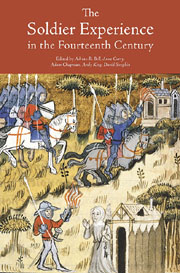Book contents
- Frontmatter
- Contents
- List of Contributors
- List of Abbreviations
- Introduction
- 1 Military Service and the Dynamics of Recruitment in Fourteenth-Century England
- 2 Total War in the Middle Ages? The Contribution of English Landed Society to the Wars of Edward I and Edward II
- 3 A Warlike People? Gentry Enthusiasm for Edward I's Scottish Campaigns, 1296–1307
- 4 Edward I's Centurions: Professional Soldiers in an Era of Militia Armies
- 5 Who's afraid of the Big Bad Bruce? Balliol Scots and ‘English Scots’ during the Second Scottish War of Independence
- 6 Rebels, Uchelwyr and Parvenus: Welsh Knights in the Fourteenth Century
- 7 Breton Soldiers from the Battle of the Thirty (26 March 1351) to Nicopolis (25 September 1396)
- 8 Towards a Rehabilitation of Froissart's Credibility: The Non Fictitious Bascot de Mauléon
- 9 The English Reversal of Fortunes in the 1370s and the Experience of Prisoners of War
- 10 The Soldier, ‘hadde he riden, no man ferre’
- Index
- Warfare in History
4 - Edward I's Centurions: Professional Soldiers in an Era of Militia Armies
Published online by Cambridge University Press: 05 February 2013
- Frontmatter
- Contents
- List of Contributors
- List of Abbreviations
- Introduction
- 1 Military Service and the Dynamics of Recruitment in Fourteenth-Century England
- 2 Total War in the Middle Ages? The Contribution of English Landed Society to the Wars of Edward I and Edward II
- 3 A Warlike People? Gentry Enthusiasm for Edward I's Scottish Campaigns, 1296–1307
- 4 Edward I's Centurions: Professional Soldiers in an Era of Militia Armies
- 5 Who's afraid of the Big Bad Bruce? Balliol Scots and ‘English Scots’ during the Second Scottish War of Independence
- 6 Rebels, Uchelwyr and Parvenus: Welsh Knights in the Fourteenth Century
- 7 Breton Soldiers from the Battle of the Thirty (26 March 1351) to Nicopolis (25 September 1396)
- 8 Towards a Rehabilitation of Froissart's Credibility: The Non Fictitious Bascot de Mauléon
- 9 The English Reversal of Fortunes in the 1370s and the Experience of Prisoners of War
- 10 The Soldier, ‘hadde he riden, no man ferre’
- Index
- Warfare in History
Summary
Introduction
In the thirteenth and early fourteenth centuries, a wide range of occupations in England were characterised by a high degree of professionalisation. In the military sphere, this type of professionalisation has received considerable attention with regard to engineers, and particularly those employed in the construction of siege engines of various types. Similarly, the men who constructed the king's crossbows and fabricated his crossbow quarrels have garnered significant attention from scholars. With respect to military personnel, professional army chaplains have been identified as serving in considerable numbers in the armies of Edward I. Members of the military households of English kings also have been recognised by scholars to have developed noteworthy professional expertise in a wide array of military affairs, including logistics, recruitment and commanding mounted forces in the field.
Absent from discussions of professionalisation up to this point, however, have been lower ranking officers, particularly those who commanded units of foot soldiers. The burden of this paper, therefore, is to shed light on the large number of men who commanded infantry forces in Edward I's wars in Wales and Scotland. In this context, I use the term professional to designate men whose primary occupation over a significant period of time was as soldiers.
In setting out to address this problem, the student of Edward I's reign is blessed with a vast corpus of administrative records that shed light on foot soldiers who served in royal armies, and on the officers who led them.
- Type
- Chapter
- Information
- The Soldier Experience in the Fourteenth Centur , pp. 109 - 128Publisher: Boydell & BrewerPrint publication year: 2011



